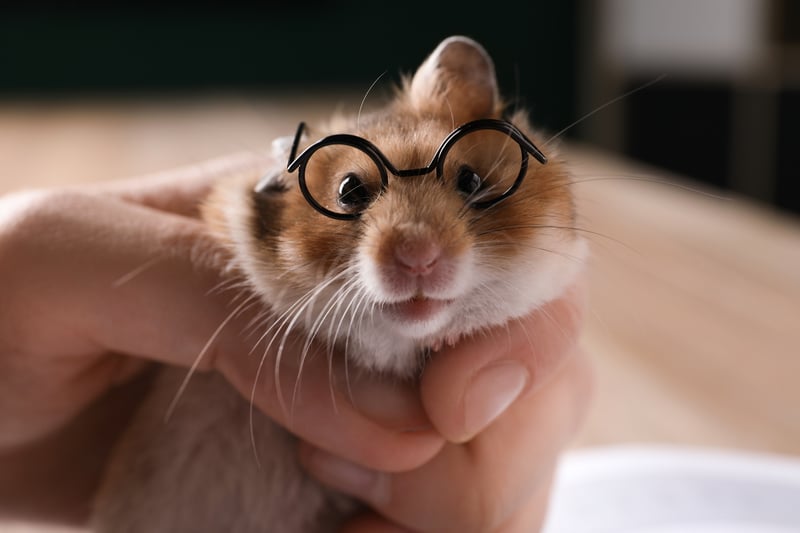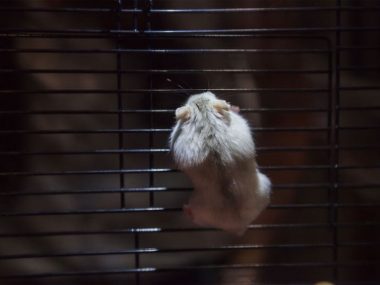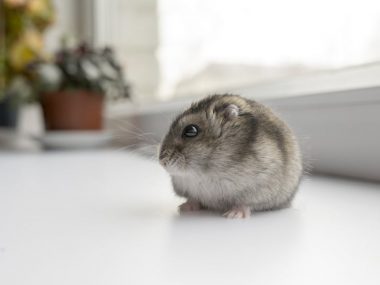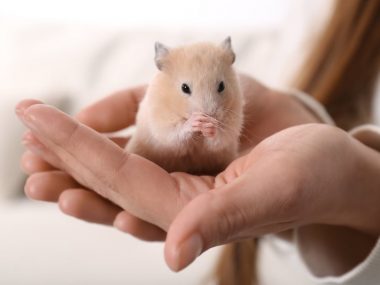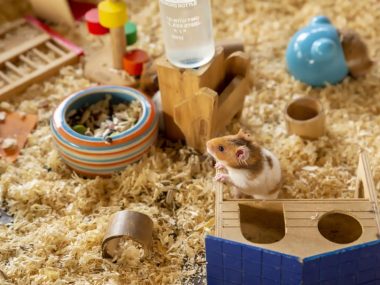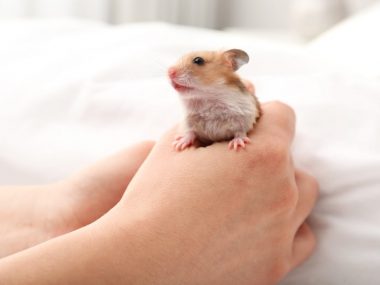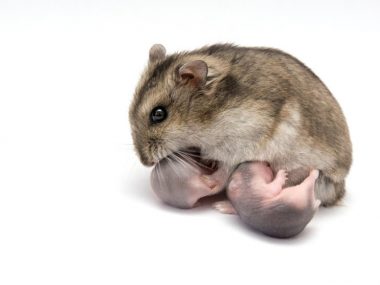Hamsters are popular small pets, and besides gerbils, they’re the most popular type of pet rodent in the United States. But are hamsters smart? How does their intelligence compare to other pets?
Hamsters are smart, just not as smart as cats or dogs. But they can learn how to use a running wheel and other common hamster toys. Hamsters can also remember their food’s location. Despite their poor short-term memory, their spatial and long-term memory makes them fairly intelligent creatures.
Let’s explore whether or not hamsters are smart and the reasons these furry rodents might be more intelligent than you give them credit for. Read on.
Table of Contents
Hamsters Have Poor Short-Term Memory
If you’ve ever owned a hamster, you’re likely aware that they’re clumsy creatures. It’s not uncommon to see a hamster walk over a ledge or suddenly stop during the middle of an activity and stare off into space.
While some of these behaviors may stem from a hamster’s poor eyesight, their short-term memory may also be to blame.
While more studies are necessary to confirm that hamsters have poor short-term memory, there is evidence suggesting that hamsters don’t form short-term memories in the same way humans do.
This lack of short-term memory makes sense, considering how humans utilize short-term memory. Unlike long-term memory, short-term memory is designed to help us recall small bits of information.
For example, you may use short-term memory to recall needed items when grocery shopping. Hours after you’ve finished your shopping, you might struggle to remember your list! That’s because short-term memory consistently resets itself to make room for new information.
Because hamsters don’t need to retain shopping lists or phone numbers, they’ve likely never developed the ability to use short-term memory! But a lack of short-term memory doesn’t mean hamsters are unintelligent—they’re known as talented escape artists, and that’s something!
Hamsters Can Master New Skills
How smart are hamsters?
While you might not be able to teach an old dog new tricks (which is a debatable adage), you can teach hamsters to perform tasks they’ve never attempted before.
For example, though hamsters have the instinct to run around at night, they’re not born understanding how to use a hamster wheel. They learn how to use the wheel in their cage via trial and error.
When you introduce a young hamster to a running wheel, it might initially use the wheel as a litterbox or a place to store food. But when they notice that the wheel spins beneath their weight, they’ll likely begin using it as a means of exercise.
Hamsters can also learn to navigate mazes (so long as the mazes contain food) by using their sense of smell. A hamster’s spatial memory is one of its greatest assets and indicators of intelligence.
Hamsters Seem To Have Decent Spatial Memory
Spatial memory is necessary for any creature to remember and plan routes to various destinations. Creatures with low intelligence lack this type of memory, making it challenging to revisit food sources or find other members of their species.
But hamsters seem to have a well-developed spatial memory. They use this type of memory to find their food dish and remember the location of their food hoards.
With this information in mind, you might ask yourself, “Are hamsters as smart as rats?”
Despite both being rodents, rats and hamsters might are not equally smart. In general, rats are easier to train than hamsters. When trained properly, rats can do impressive things. A study conducted by Ben Vermaercke and his colleagues at KU Leuven found that rats can be smarter than people!
A Hamster’s Sense of Smell Might Help It Remember Things
Hamsters are born with comparatively poor eyesight. Instead of using their eyes to make out fine details and colors, their eyes mostly function to perceive whether their environment is light or dark.
This lackluster eyesight helps hamsters determine whether it’s night or day, and it’s also partially responsible for initiating breeding. But because hamster vision is so poor, they need to rely on their other senses to navigate the world around them.
Consequently, a hamster’s hearing and sense of smell are more finely tuned than their vision. These rodents may use both of these senses to detect predators, find food, and identify one another.
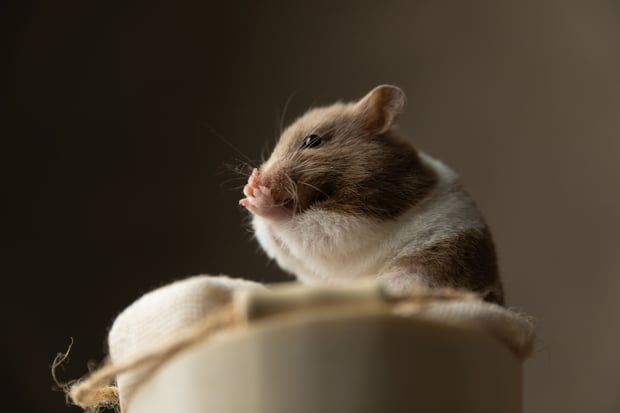
Because smell is closely associated with memory, there’s a good chance that a hamster’s long-term memories are tied to their sense of smell. So it’s conceivable that a hamster might recognize its owner based on its owners’ scents!
Frequently Asked Questions About Hamster Intelligence
Do you have any lingering questions about hamster intelligence? If so, you may find the answer you’re looking for just below.
Do Hamsters Recognize Their Owners?
Hamsters can recognize their owners, and they may also remember different people they have met. In one study, researchers found that hamsters were significantly more likely to approach a person they’ve been around before than a person they’ve never seen before.
There’s also plenty of anecdotal evidence supporting the idea that hamsters are capable of recognizing individual people. Though hamsters have notoriously poor eyesight, their sense of smell may trigger long-term memories, helping them identify specific individuals.
Is a Hamster Smarter Than a Dog?
Hamsters are not as intelligent as dogs. Though dogs initially require treats or physical affection when learning tricks, they will eventually respond to physical or voice commands without the presence of a treat. Hamsters only respond when treats are present.
That said, you may be able to teach a hamster to perform tricks by offering tasty snacks. Just don’t be surprised if your hamster ignores you when it realizes that you don’t have any carrots, yogurt drops, or sunflower seeds!
Do Hamsters Use Tools?
Hamsters don’t use tools in the same way that humans do, but they enjoy using toys as a means of physical and mental stimulation. If you’ve only provided your hamster with a running wheel, you’ll want to consider adding other toys to its enclosure.
To keep your hamster busy, you can also buy a pack of engaging toys like the Suwikeke Hamster Chew Toy 7-Pack from Amazon.com. This toy pack comes with various chewable toys that can stimulate your hamster’s curiosity via tinkling bells or rolling parts.
So, instead of only providing your hamster with a running wheel, consider investing in a variety pack of toys. Not only will your hamster appreciate the diverse array of new activities, but you’ll enjoy watching them explore wooden barrel tunnels and roll around on wooden balance wheels.
Conclusion
Hamsters may be small and furry, but that doesn’t mean they’re not smart. They can be pretty ingenious when finding ways to get what they want. So if you think they’re not worth your time, think again. Hamsters are a species worth getting to know.
